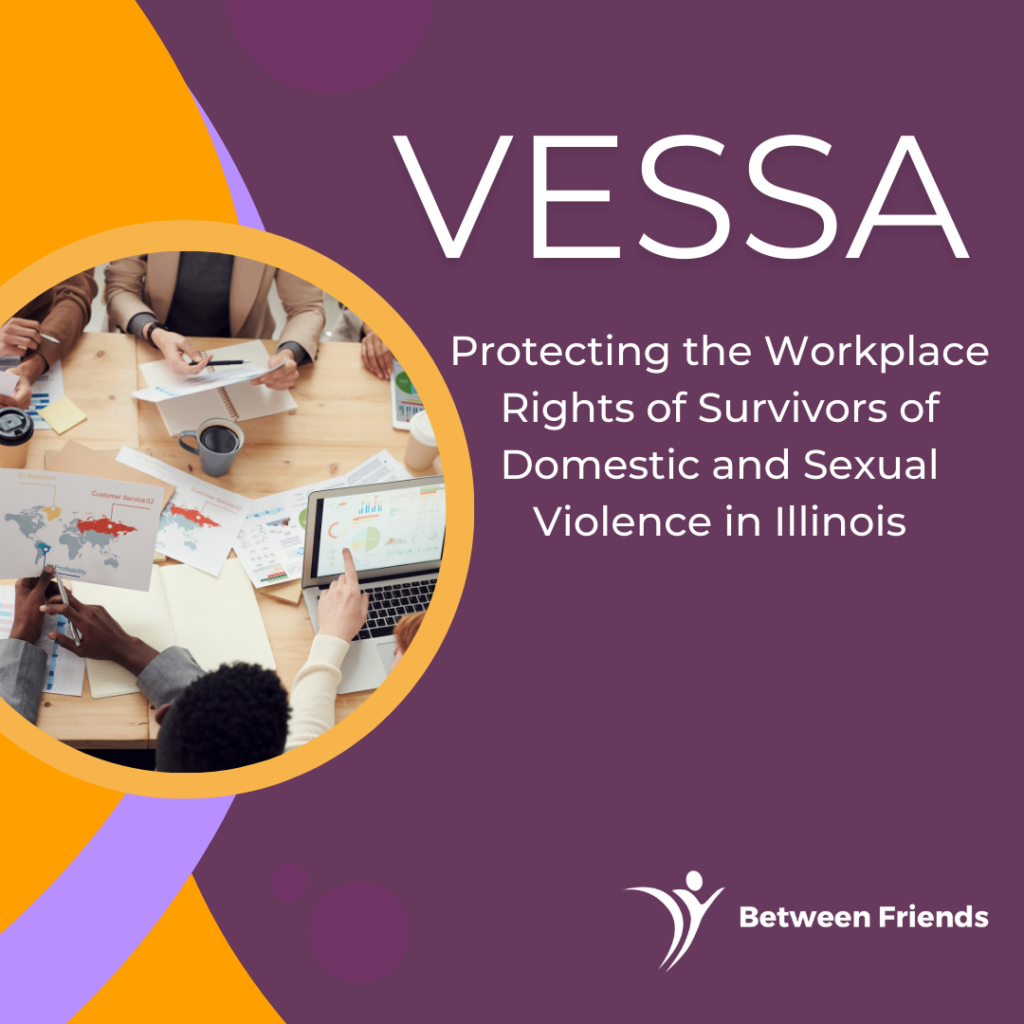Have you heard of VESSA?
Most people have not heard of this law, but it provides important on-the-job safety protections for survivors of domestic or sexual violence. VESSA stands for “Victim Economic Security and Safety Act”. It is an Illinois law passed in 2003 and amended and strengthened over the years.
So, what does VESSA do?
It provides an employee who has experienced domestic or sexual violence, or their household member, with 4 to 12 workweeks of unpaid leave (depending on the size of the organization), it prohibits employers from discriminating against domestic or sexual violence survivors, and it requires employers to support their employees in taking safety measures while at work.
What are the requirements for unpaid VESSA leave?
- Survivors working for an employer with at least 1, but not more than 14, employees, are entitled to take 4 workweeks of leave during any 12-month period.
- Survivors working for an employer with at least 15, but not more than 49 employees, are entitled to take 8 workweeks of leave during any 12-month period.
- Survivors working for an employer with at least 50 employees are entitled to take 12 workweeks of leave during any 12-month period.
- The leave does not need to be taken all at once. It can be taken intermittently or on a reduced work schedule.
- Employers are required to maintain the confidentiality of all information related to the use of a VESSA leave
What are the reasons why an employee who has experienced domestic or sexual violence, or their household member, can take VESSA leave?
- To seek medical attention for physical or psychological injuries cause by the violence
- To recover from the physical or psychological injuries
- To receive “victim services”
- To obtain counseling
- To participate in safety planning, including temporary or permanent relocation or other actions to increase safety
- To seek legal assistance to ensure their health and safety, including participation in court proceedings related to the violence
- Employees may also take up to 10 days off to attend a funeral, arrange a funeral, or grieve a household or family member killed in a violence crime
What is needed to request an unpaid VESSA leave?
- An employee needs to tell their employer that they, or a household member, have experienced domestic or sexual violence and would like to take VESSA leave as a result (usually by writing a letter explaining the situation)
- Employers can request proof through a sworn statement (a written statement that the employee signs)
- When practical an employee needs to provide their employer with 48 hours advance notice of their intention to take leave
- When notice is not practical, an employee needs to provide their employer with certification of their absence within a reasonable period
- Employers are prohibited from acting against their employee for an unscheduled absence if the employee provides certification
If an employer requires certification in order to give VESSA leave, what documents will satisfy the requirement?
- If the survivor has a letter from a victim services organization, an attorney, a member of clergy, a medical provider, or any other professional that provided domestic or sexual violence related assistance this will satisfy the requirement
- If the survivor has a police report or court record this will satisfy the requirement
- If the survivor has other corroborating evidence this will satisfy the requirement
- If the survivor does not have any of these documents, a sworn statement by the employee will fulfill the legal requirement, but other proof is helpful.
Besides unpaid VESSA leave, what other protections does this law provide?
- Employers are prohibited from discharging, constructively discharging, harassing or otherwise discriminating against an employee for exercising their rights under VESSA, or for filing a VESSA claim against them
- Employers are prohibited from firing or discriminating against an employee because they are, or has a household member who is, a survivor of domestic or sexual violence
- Employers are prohibited from discriminating against survivors or their family members even when the abusive party causes problems at the workplace
- Employers are required to make reasonable safety accommodations for a survivor/employee, or their household member, in a timely fashion, unless it would be an undue hardship (some examples of reasonable accommodations are changing an employee’s schedule, worksite, extension number, etc; screening employee calls; documenting violent incidents that may happen in the workplace)
If you are interested in reading VESSA in its entirety, please visit this link: https://www.ilga.gov/legislation/ilcs/ilcs3.asp?ActID=2502&ChapterID=68


